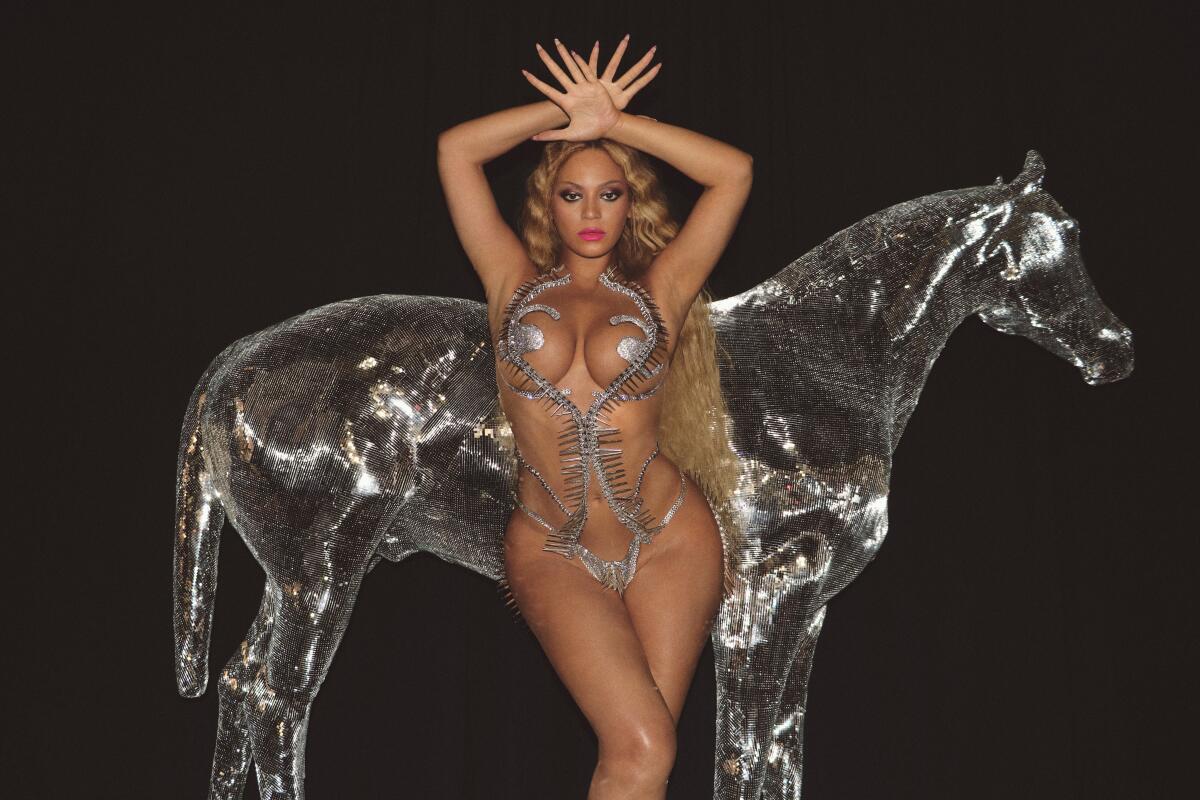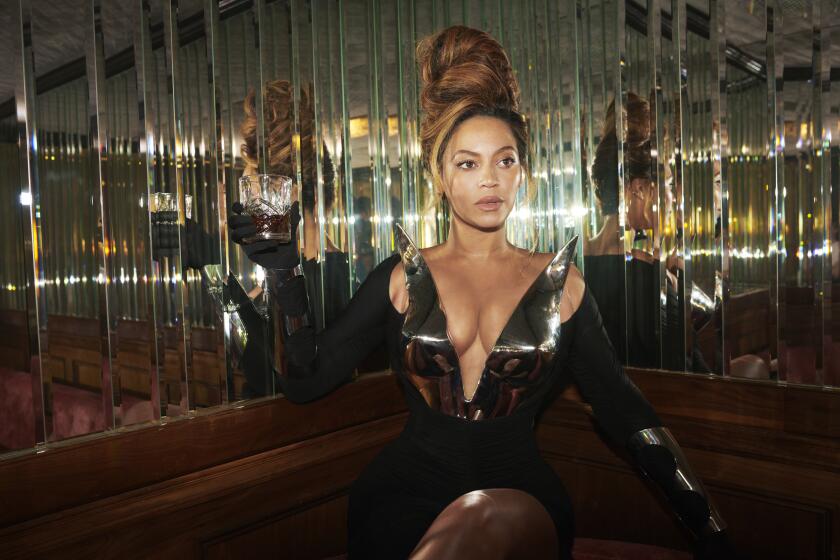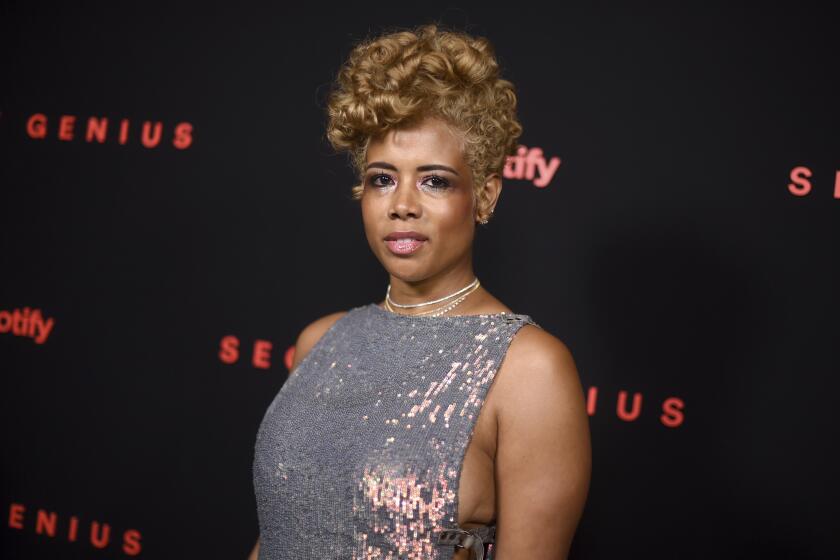‘The category is Bey’: Beyoncé sings about her scars, and her sister on ‘Renaissance’

- Share via
Ignore the leaks — Beyonce’s seventh studio album “Renaissance” has officially arrived. As hinted, it’s an all-encompassing album for the dance floor, blending house, disco, afrobeat and more on a 16-song body of work, that compels you to simply “Move.”
Beyoncé revealed Thursday that she made the album in honor of her “Uncle Jonny,” who passed away from HIV complications. Jonny was the nephew of Beyoncé’s mother, Tina Knowles, and she’s paid tribute to him in the past. She credited him for exposing her to the sounds that inspired “Renaissance.”
For the record:
1:12 p.m. Aug. 3, 2022A previous version of this story said Beyoncé’s “Church Girl” sampled Nelly’s song “Tip Drill.” It actually interpolated “Where They At” by DJ Jimi, which was also sampled by Nelly.
“A big thank you to my Uncle Jonny,” Beyonce wrote on her website. “He was my godmother and the first person to expose me to a lot of the music and culture that serve as inspiration for this album. Thank you to all of the pioneers who originate culture, to all of the fallen angels whose contributions have gone unrecognized for far too long. This is a celebration for you.”
A leak threatened to disrupt her meticulously plotted rollout, but no matter: ‘Renaissance’ is as musically (and sexually) provocative as any album in 2022.
Read on for some of the album’s most interesting lyrics.
1. “Kiss my scars, because I love what they made”
Beyoncé has shown love to her children across her catalog, but on track two of “Renaissance,” she honors her own body for bringing them into the world. Right from the outset, she practices resilient joy in the face of turmoil on “Cozy,” singing “Damn, I love the burning of the dagger from the words that you say / Dancin’ in the mirror, kiss my scars because I love what they made.”
The night the album dropped, Beyoncé posted a photo of her children asleep at her side. Below the photo, she thanked an assortment of people, along with her own family for giving her the freedom to make the album she dreamed of.
“I want to give a special thank you to Rumi, Sir and Blue for allowing me the space, creativity, and inspiration,” she wrote. “And a special thanks to my beautiful husband and muse, who held me down during those late nights in the studio.”

2. “Might I suggest you don’t f— with my sis / ‘cause she’s comfortable”
Beyoncé loves her family, but don’t expect that love to extend if you step out of line. Later on “Cozy,” she sings about her sister and fellow singer Solange, warning you to watch out and not provoke her if you’re not ready for what could happen.
Of course, the world got a firsthand look at Solange’s hands after a 2014 Met Gala after-party. While Jay Z, Beyoncé and Solange were in an elevator, Jay Z and Solange got into an argument, which led to Solange trying to strike Jay Z while Beyoncé looked on.
Kelis put Beyoncé and Pharrell Williams on blast Thursday for sampling one of the singer’s songs without her permission or even advance notice.
The three made up behind closed doors, but Beyoncé has referenced the incident before. “Of course sometimes s— goes down when there’s a billion dollars on an elevator,” she sang on 2014’s “Flawless.” Hov reflected on the debacle a few years later on his own album, “4:44,” rapping, “you egged Solange on, knowing all along / all you had to say, you was wrong.”
3. “Must be the cash ‘cause it ain’t your face”
Beyoncé doesn’t care if you’re mad on this album, and there are plenty of moments where she’s shooting you down with no holds barred. In “Church Girl,” she flips the ruthless line from DJ Jimi’s track “Where They At,” changing “it must be the p— cause it ain’t your face” to “Must be the cash, ‘cause it ain’t your face” on the song’s outro.
As a whole, the song turns the church on its head, opening with traditional gospel before trapping out the drums to let herself go, “Church girls acting loose, bad girls acting snotty,” she sings on the chorus while instructing you to drop it low and dance as you please. The song only grows more explicit from there: “You can be my daddy if you want to / you can get it tatted if you want to,” she continues after the chorus.

4. “Call me when you want to get hi-i-i-i-i-gh”
When the album track list first appeared, more than a few people expected Beyoncé to attack the myriad issues plaguing the country on “America Has a Problem.” Instead, the song is hyper-focused on the white powder that is prevalent on dance floors: cocaine.
“America Has a Problem” samples Kilo Ali’s 1990 cut of the same title, borrowing the synth stabs that start the song off along with the a capella chant “America? America has a problem.” Released in the midst of the crack epidemic, Kilo Ali’s song speaks on the downward spiral from friend to fiend, along with the health, legal and mental problems it can cause to those who either hit it or sell it. More than 20 years later, Beyoncé’s version remixes it with an eerie bassline that keeps that same emotion, comparing her addictiveness to that of the powder with lines like “I’ma make you go weak for me / Make you wait a whole week for me / I see you watching, fiending / I know you want it, scheming.”
The track is filled with references to the ski slopes, calling someone’s ex a “dope” that still “ain’t crack enough,” while elsewhere referencing Tony Montana, the famed drug lord from the 1983 movie “Scarface.”

5. “The category is Bey”
Beyoncé travels across the realm of Black music on “Renaissance,” as she’s done throughout her catalog. If you’re lost trying to keep up with the different styles, she sums it up on the album’s final song “Summer Renaissance,” with the line, “The category is Bey.”
It’s not her only ballroom reference on the album — elsewhere on “Alien Superstar,” the category is “bad b—,” and Beyoncé is the bar. Toward the album’s end, “Pure/Honey” sees Queen Bey speaking over the pulsing synths that can only be heard in full effect on the dance floor.

More to Read
The biggest entertainment stories
Get our big stories about Hollywood, film, television, music, arts, culture and more right in your inbox as soon as they publish.
You may occasionally receive promotional content from the Los Angeles Times.











